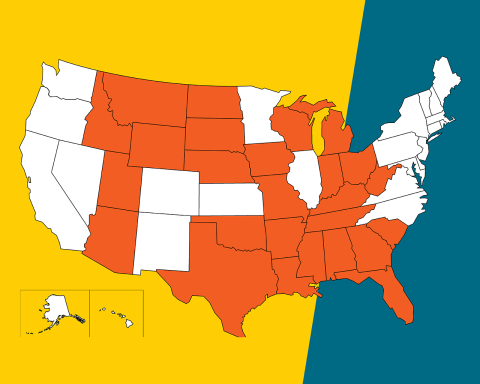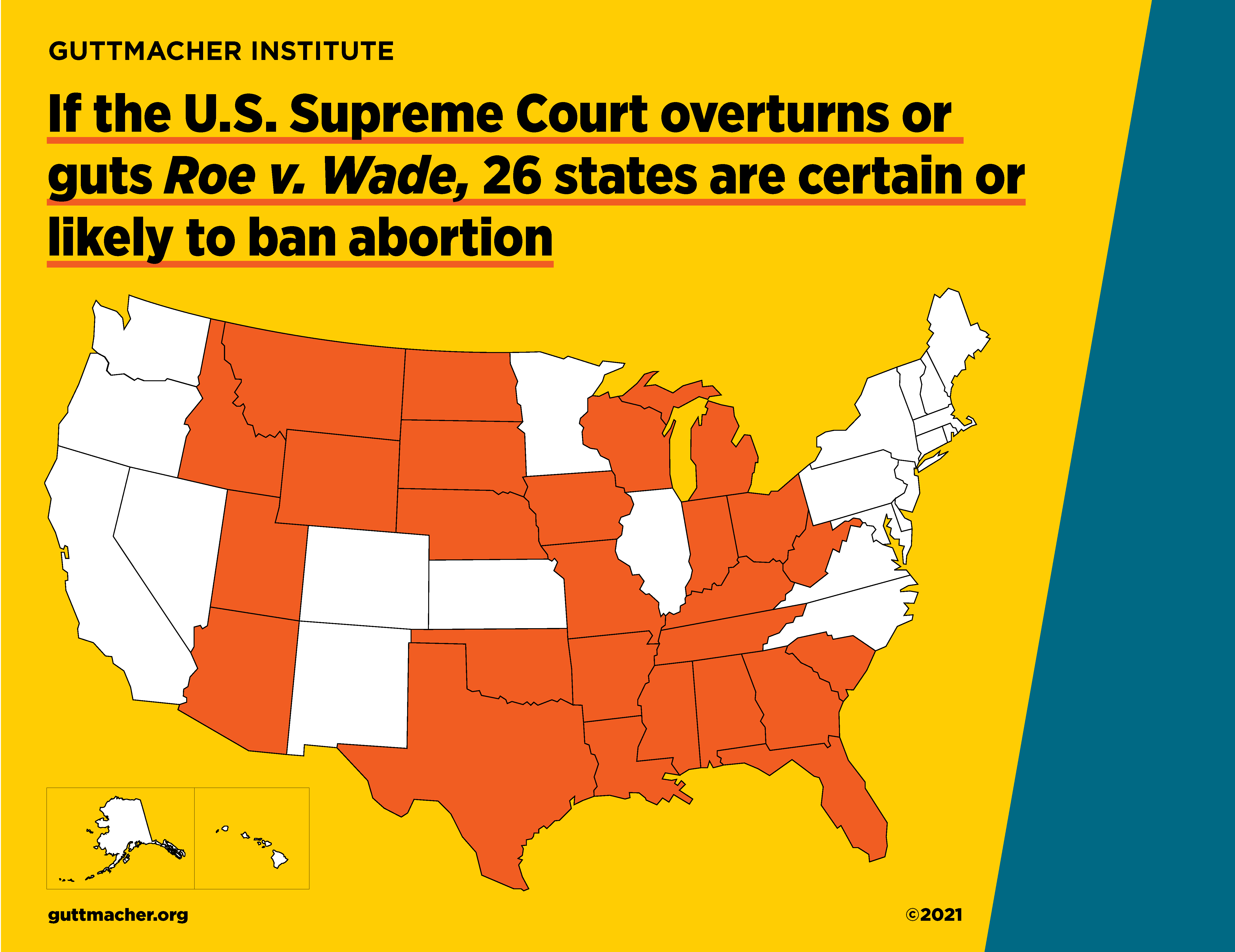Please note: An updated version of this analysis was published on January 10, 2023 to reflect state policy changes since Roe v. Wade was overturned. Recent victories for abortion rights in two states originally on this list—Michigan and South Carolina—reduce the number of states certain or likely to ban abortion from 26 to 24.
Updated on April 19, 2022:
This analysis has been updated to reflect Wyoming’s enactment of a "trigger" ban in March 2022 that moved the state from the category of likely to ban abortion to certain to ban abortion if Roe v. Wade is overturned. Updated information was added on 2022 Florida legislation and mention of North Carolina’s pre-Roe abortion ban.
First published on October 28, 2021:
On December 1, 2021, the U.S. Supreme Court will hear oral arguments in Dobbs v. Jackson Women’s Health Organization, a case on the constitutionality of Mississippi’s 15-week abortion ban that will specifically address whether a state can ban abortion before viability (generally 24–26 weeks of pregnancy). The Supreme Court taking this case at all is a stunning development, but the state of Mississippi has gone even further and asked the Court to outright overturn Roe v. Wade, the 1973 case that affirmed a constitutional right to abortion.
It is far from a foregone conclusion that the Court will cast aside five decades of precedent to overturn Roe and allow states to ban abortion. However, by even accepting the case, the Court has signaled that it is willing to revisit the legality of abortion. Furthermore, the Court’s September 1 decision to decline to block an unconstitutional six-week abortion ban in Texas (S.B. 8) from going into effect may be an indicator of its intent.
States Certain to Ban Abortion
If Roe were overturned or fundamentally weakened, 22 states have laws or constitutional amendments already in place that would make them certain to attempt to ban abortion as quickly as possible. Anti-abortion policymakers in several of these states have also indicated that they will introduce legislation modeled after the Texas six-week abortion ban.
By the time the Supreme Court hears oral arguments in the Mississippi case, there will be nine states in this group with an abortion ban still on the books from before Roe v. Wade, 13 states with a trigger ban tied to Roe being overturned, five states with a near-total abortion ban enacted after Roe, 11 states with a six-week ban that is not in effect and one state (Texas) with a six-week ban that is in effect, one state with an eight-week ban that is not in effect and four states whose constitutions specifically bar a right to abortion. Some states have multiple types of bans in place.
Pre-Roe ban: Law enacted before 1973 and never removed
"Trigger" ban: Law designed to be "triggered" and take effect automatically or by quick state action if Roe no longer applies
Near-total ban: Law enacted after Roe to prohibit abortion under all or nearly all circumstances (several of this type are currently blocked by court order)
Six-week ban: Law prohibiting abortion after six weeks of pregnancy (one in effect)
Eight-week ban: Law prohibiting abortion after eight weeks of pregnancy (none in effect)
State constitution bars protection: Constitution amended to prohibit any protection for abortion rights
- Alabama—Pre-Roe ban, Near-total ban, State constitution bars protection
- Arizona—Pre-Roe ban
- Arkansas—Pre-Roe ban, Trigger ban, Near-total ban
- Georgia—Six-week ban
- Idaho—Trigger ban, Six-week ban
- Iowa—Six-week ban
- Kentucky—Trigger ban, Six-week ban
- Louisiana—Trigger ban, Near-total ban, Six-week ban, State constitution bars protection
- Michigan—Pre-Roe ban
- Mississippi—Pre-Roe ban, Trigger ban, Six-week ban
- Missouri—Trigger ban, Eight-week ban
- North Dakota—Trigger ban, Six-week ban
- Ohio—Six-week ban
- Oklahoma—Pre-Roe ban, Trigger ban (effective November 1, 2021), Near-total ban, Six-week ban
- South Carolina—Six-week ban
- South Dakota—Trigger ban
- Tennessee—Trigger ban, Six-week ban, State constitution bars protection
- Texas—Pre-Roe ban, Trigger ban, Six-week ban
- Utah—Trigger ban, Near-total ban
- West Virginia—Pre-Roe ban, State constitution bars protection
- Wisconsin—Pre-Roe ban
- . Wyoming—Trigger ban
States Likely to Ban Abortion
An additional four states have political composition, history and other indicators—such as recent actions to limit access to abortion—that show they are likely to ban abortion as soon as possible without federal protections in place.
- Florida—In 2021, the state legislature attempted to ban abortion at 20 weeks of pregnancy and an effort to adopt a Texas-style six-week ban was publicized. In April 2022, a 15-week abortion ban was enacted that is scheduled to go into effect in July.
- Indiana—In the past decade, the legislature has enacted 55 abortion restrictions and bans, paving the way for a comprehensive ban.
- Montana—For the first time in nearly a decade, new abortion restrictions were enacted in 2021, including restrictions on medication abortion and abortion at 20 weeks of pregnancy. (These restrictions currently cannot be enforced due to a court order.)
- Nebraska—Although not one of the most prolific states on enacting abortion restrictions, it was the first to adopt a 22-week ban (in 2010), and in 2020, enacted a ban on the standard method for abortion after 15 weeks.
Beyond the 26 states certain or likely to attempt to ban abortion immediately, other states have demonstrated hostility toward abortion by adopting multiple restrictions in the past, but are not likely to ban abortion in the near future. Notably, North Carolina has a pre-Roe abortion ban in place, but it is unclear if the state’s law would be implemented quickly. However, this analysis may change in the next few years.
It is also important to remember that Roe would not have to be overturned entirely to start the process of activating some trigger laws. If the Court weakens or undermines existing federal constitutional protections, that may be enough momentum for states to start implementing these bans.

